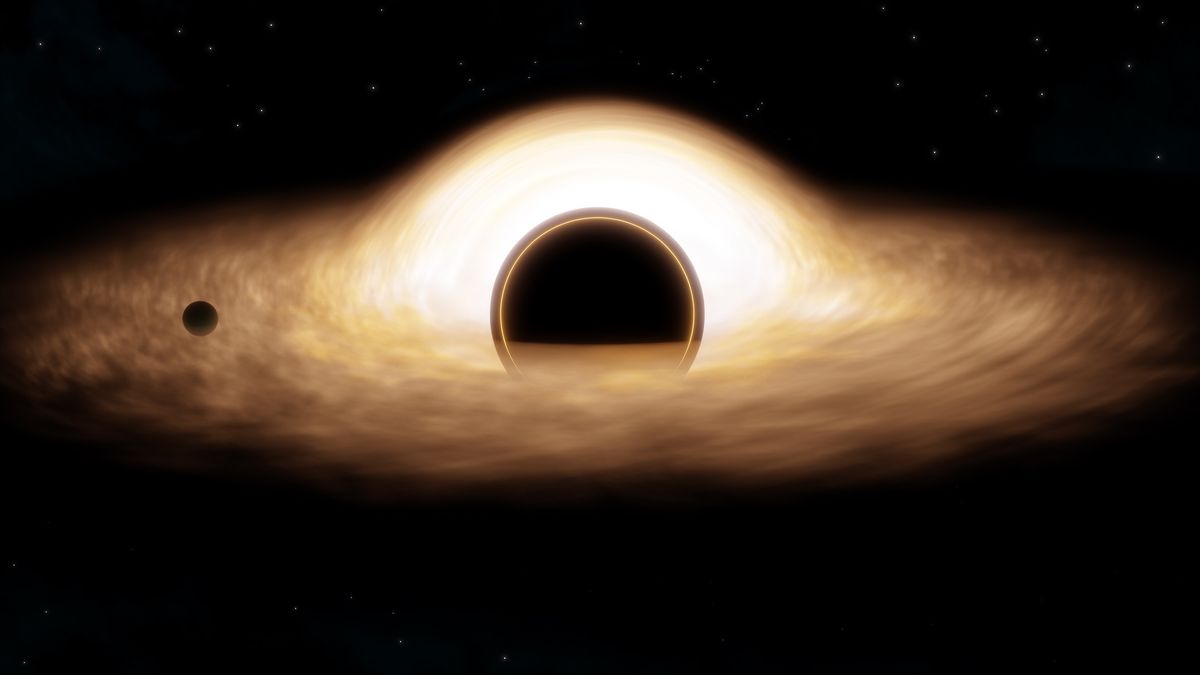Black holes are massive, mostly invisible and so powerful not even light can escape them. So what would happen if one entered our solar system?
It depends on a lot of factors, including the size and distance of the black hole, experts told Live Science. But in many scenarios, not much would happen.”They’re not, per se, destructive,” Karina Voggel, a postdoctoral researcher at the Strasbourg Astronomical Data Center in France, told Live Science. “It’s just mass. Very compressed mass, but mass. It’s not a cosmic vacuum cleaner.”
If a black hole did wander into our solar system, the largest effects would be gravitational. And those effects would depend on the mass of the black hole.
“The black holes that we’re confident exist are all much more massive than the sun,” Robert McNees, an associate professor of physics at Loyola University Chicago, told Live Science. “And the sun’s gravity dominates the behavior of bodies in the solar system all the way out to tremendous distances, and so anything more massive than the sun wandering into our neighborhood on scales much larger than the solar system would have noticeable effects.”
The black holes we know of are either stellar-mass black holes — that is, black holes that are between a few to 100 times the mass of the sun — or supermassive black holes, which are 100,000 to billions of times the mass of the sun and are generally found at the centers of galaxies. But there are other possibilities, too.
Related: Could Earth be inside a black hole?
For example, it may be possible to create mini black holes in a particle accelerator. These would range from a single gram to around the mass of a human, and they’d be microscopic in size. “Nothing would happen if that just passed by, even if it passed by right in front of my face, because they evaporate in less than a second,” Voggel said.
Then, there are primordial black holes, which may have formed as a result of mass and density fluctuations in the very early universe.
“It’s not completely ruled out that there might be primordial black holes floating around in the universe with masses comparable to a few Earth masses,” McNees said. “And something that’s a few Earth masses wouldn’t have the really drastic gravitational effects that an astrophysical black hole would have if it entered into our solar system.”
Some astronomers have even considered whether Planet Nine, a hypothetical planet far out in the solar system that may be responsible for irregularities seen in the orbits of our known planets, could be a “baby” black hole in the mass range of what could be a primordial black hole.
But considering that this object, if it does exist, causes only tiny irregularities in the solar system’s planets, a primordial black hole far out in the solar system wouldn’t have very big effects.
However, if a stellar-mass or larger black hole were to whiz through our solar system, it could spell disaster, depending on how close and how fast it was. If it passed through the Oort cloud — the most distant region of the solar system — it could disturb the comets and asteroids that orbit there and cause them to head toward our own planet, Voggel said.
If the black hole got a bit closer — say, 100 astronomical units, or just beyond the orbit of Pluto — it could change the orbits of Uranus, Neptune and Pluto. “But likely Earth wouldn’t be affected much yet,” Voggel said.
Only once the black hole crossed between the orbits of Uranus and Pluto would Earth start to feel its effects. “If Uranus and Pluto were passed by really close, they might get attracted by the black hole dynamically so much that they’re now in orbit around the black hole,” Voggel said. And now our orbit would be altered.”
That could change our seasons, plunging us into an ice age or raising temperatures so much that life on Earth went extinct.
Related: How does a black hole form?
If the black hole passed within Saturn’s orbit, it would probably move us outside the habitable zone where liquid water can exist. If it passed within Jupiter’s orbit, we’d begin to feel tidal effects as Earth began to orbit the black hole.
“If you go even closer … between us and Mars or something, then you resurface the Earth,” Voggel said. “The tidal effects would heat it. You would have magma; the oceans would evaporate; definitely no life possible anymore.”
But both Voggel and McNees said all of these scenarios are extremely unlikely. “We worry about asteroids occasionally hitting the Earth, but that’s because there’s lots of those,” McNees said. “So even though the chances for each individual one are pretty small, the solar system is just peppered with them.”
But black holes are much rarer in the universe, and the chance of one traveling through the solar system even a single time is low — much less that it would collide with something. “Obviously, you could make a summer blockbuster about it.” McNees said.




















Discussion about this post